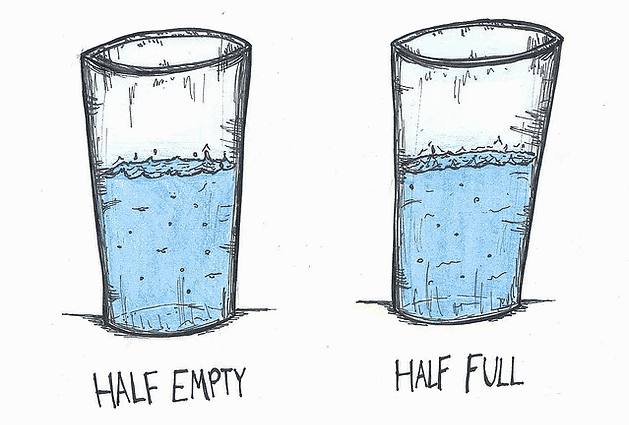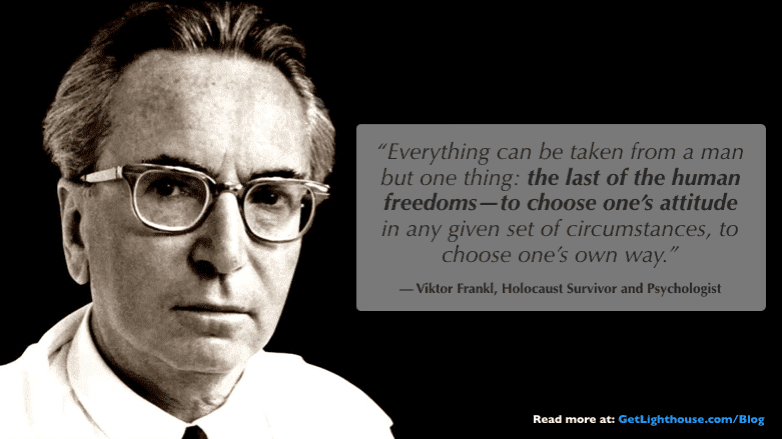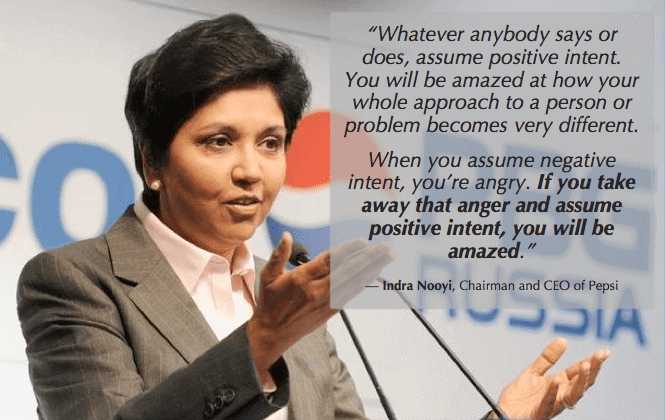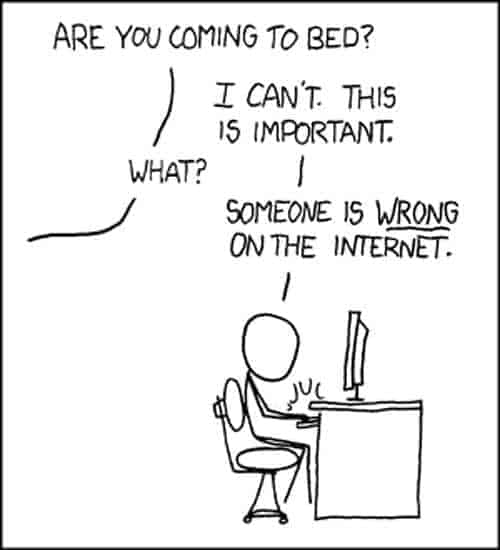How do you feel about life right now? Are you filled with enthusiasm and a positive outlook? Or, do you find yourself negative at times, seeing the worst in the world and others?
We all have our ups and downs, and what's happening to and around us has a big impact on it. It's harder to be positive when life is dragging you down.
However, regardless of our circumstances, as leaders we have to hold ourselves to a higher standard. Our attitudes not only affect us, but the performance, happiness, and outlook of our teams.
You owe it to yourself and your team to take a moment today to think about your outlook. Today, we help you explore if you have a positive outlook, and how to be positive more often so you can be a better leader.
A Tale of 2 Outlooks: How a Positive Outlook makes all the Difference
The outlook you bring to the world makes a huge difference in how you feel about your life, how those around you are treated by you, and the vibe they'll feel from you. You can't control everything that happens to you, but you can control your mindset.
Let's take a look at the same day through a negative and a positive outlook, and see how it affects you as a leader.
1) A Negative Outlook
As you're getting ready in the morning, your phone rings. It's your credit card company. It seems your number's been stolen, but they caught it early. They've already refunded the charges, and are express mailing you a replacement.
You think to yourself, "Why does this *always* happen *to me*? My idiot credit card company probably got hacked and don't want to admit it. Or, maybe it was that crappy store I bought that thing that fell apart as soon as I got it."
Sharing your discontent, you tell the representative, "It's so annoying that I won't be able to use my credit card until Wednesday!"
A dose of social media
As you head into work, you check Twitter. Three tweets catch your eye:
- Engragement: Trump or Hillary (whomever you didn't vote for) is at it again saying something you don't like.
- Good news? A friend tweets their excitement about a promotion.
- Something to learn? One of your favorite researchers posts a lengthy article on a topic you've been meaning to learn more about.
As you read the tweet about Trump/Hillary, you can feel your chest tighten. You curse them under your breathe. With the face you're making at your phone, it's a good thing Siri doesn't have feelings.
Then, you see your friend's tweet. Instead of being happy, you're jealous. You think, "ugh, now I have to go pretend to be happy for them when they want to go get drinks to celebrate."
You finish up your Twitter session by opening the article. However, you quickly give up when you realize the length. "Who has time to read all this? Can't they do a TLDR? <sigh>"
Into the office
When you get to the office, you have a stack of emails waiting for you. Among the emails is one from a direct report of yours who gave a great presentation last week. Unfortunately, the report attached in the email has some typos, which you've been working with them to try to eliminate.
With all the bad things happening today, you're already in a bad mood, and their mistakes in their report are just icing on the cake. You think to yourself, "Can't they ever learn? I can't imagine they're going to last." Their great work last week is the farthest from your mind, and you never do get around to telling them how much you liked it.
How does this outlook make you feel? Would you want to be around this person? I wouldn't.
And how would it feel to work for them? Coming in, all upset, looking for reasons to be unhappy, and never praising anything that was good. Sounds like a miserable work life.
Let's look at this same day, through a different outlook. How could it be different?
2) A Positive Outlook
As you're getting ready in the morning, your phone rings. It's your credit card company. It seems your number's been stolen, but they caught it early. They've already refunded the charges, and are express mailing you a replacement.
You think to yourself, "Wow. What great service!" I'm glad I didn't have to wait until my bill came to discover this. It's so nice they called me and already took care of everything."
You thank the representative on the phone and tell them, "I think I can manage not having this card for a couple days."
A dose of social media
As you head into work, you check Twitter. Three tweets stand out:
- Engragement: Trump or Hillary (whomever you didn't vote for) is at it again saying something you don't like.
- Good news? A friend tweets their excitement about a promotion
- Something to learn? One of your favorite researchers posts a lengthy article on a topic you've been meaning to learn more about.
You ignore the tweet about Trump/Hillary, knowing it won't make your day.
Then, you see your friend's tweet. You heart the tweet and tweet back excitedly to your friend, "What great news! Congrats on the job. Let's catch up soon!"
It's always exciting to see your friends do well. You know you're the average of the 5 people around you, so as your friends do better you appreciate that other doors are bound to open for you.
You finish up your Twitter session by opening the article, but realize you can't read it all now. Instead, you copy the URL and paste it to read later when you have time on the commute home. Now, you have something to look forward to when you head home for the day.
Into the office
When you get to the office, you have a stack of emails waiting for you. Among the emails is one from a direct report of yours who gave a great presentation last week. Unfortunately, the report attached in the email has some typos, which you've been working with them to try to eliminate.
You know this team member has been working hard the last few weeks and it could be an innocent mistake. Because of this, you give them the benefit of the doubt.
You also recognize that praising what you want to see more of can go a long way. With a smile on your face, you walk over to their desk and praise them for how well the presentation went, specifically highlighting what you hope they'll keep doing.
When you get back to your desk, you make a note to go over the report issues as part of their next 1 on 1.
How does this version make you feel? Would you want to be around this person? I would.
And how would it feel to work for them? They sound like the kind of supportive, positive manager, we'd all love to have.
Whether you have a positive outlook is a choice
We've all been both of those people. Hopefully, more often the latter, positive one, but we all have our tough days.
And unfortunately, sometimes they're even tough weeks or years. If you're facing death, sickness, divorce, financial struggles, or something else your human spirit can truly be challenged.
The true challenge is to overcome whatever life throws at us, and to not let outside forces drag you down when life is pretty good.
Lead by example
As managers, people notice everything we do. They look to us for leadership, attitude, culture, and behaviors.
One of the things I've personally worked a lot on lately (and this relates directly to our recent post on Self Awareness) is having a positive outlook more often. It's so easy to slip into negativity, especially when the world wants to bombard us with reasons to be mad.
Most important in all of this is your attitude toward your team.
If you have a negative outlook on a team member, don't be surprised if you create a self-fulfilling prophecy of problems with them.
That's why Indra Nooyi's quote about positive intent is so important. It can completely change the outcome of tough situations with your team.
If you look hard enough anyone can show great potential that you can nurture with praise. You can also look hard enough to find reasons why someone is terrible and should get no credit for anything good they do.
The manager who encourages their team with praise on the things they want to see more of will have more success getting the most from their team than the manager who uses sharp criticism and a pessimistic attitude towards a team member.
The angry, critical manager may get some results early on, but resentment, frustration, and learned helplessness will catch up with them. They'll be left wondering why their team is leaving in waves, or performance fails to improve no matter how much they yell.
As Dale Carnegie wrote, "A drop of honey catches more flies than a gallon of gall."
Take a minute and ask yourself:
- What mindset are you bringing into the office?
- How is your outlook different for various people on your team?
- Does your outlook attract people to you, or make them want to avoid you?
These can be tough questions to ask if you've been more negative lately, but few changes can have as great an impact.
Knowing how hard changing your outlook can be, we're going to help you start down the path to a more positive outlook. Here's three places to start.
3 Ways to Have a More Positive Outlook to be a Better Leader
Having a better, more positive outlook can have surprisingly powerful results. As Dale Carnegie relays in How To Win Friends an Influence People, one of his students felt an amazing impact:
"...the next morning, while combing my hair, I looked at my glum mug in the mirror and said to myself, 'Bill, you are going to wipe the scowl off that sour puss of yours today. You are going to smile. And you are going to begin right now.'
As I sat down to breakfast, I greeted my wife with a 'Good morning my dear,' and smiled as I said it.
You warned me that she might be surprised. Well, you underestimated her reaction. She was bewildered. She was shocked.
...This changed attitude of mine brought more happiness into our home in the two months since I started than there was during the last year."
Hopefully, you're not as glum as Carnegie's student, and you may not be the type to just give yourself orders in the mirror. So, let's talk about the practical things you can do to similarly bring more happiness to your home and work.
1) Meditate
When you think of meditation, incense, Buddhist monks, and hippies may come to mind. However, that's a narrow view of a habit that many embrace.
Getting beyond stereotypes, many well-known leaders swear by meditation including:
- Jeff Weiner, CEO of Linkedin
- Arianna Huffington, founder of the Huffington Post
- Jerry Seinfeld, comedian
- Ray Dalio, billionaire investor and author of Principles
- Russell Simmons, cofounder of Def Jam Recordings and clothing line Phat Farm
- Oprah Winfrey, talk show host and media mogul
Meditation has been around for thousands of years. There's a reason it's lasted this long and continues to be popular. It really works, and can help in a variety of beneficial ways including:
- Boosting your immune system
- Decreasing depression, anxiety and stress
- Improving your memory, creativity, and focus
And it can help improve your outlook. As one of my friends, and the CEO of a great, growing company told me recently:
"I always start my morning and end the day with meditation. It has allowed me to slow down, and see where the source of a lot of anxiety, frustration, etc. stem from. 99% of the time it's a mindset issue.
Meditating allows me to dissect why the mindset is causing the emotion and breathe through it. Doing so has helped me ten-fold with having a better outlook."
Convinced? Ready to give it a try? Our friends at 10% Happier tell you exactly how to meditate no matter where you are in a post here.
2) Take time to reflect
As we wrote recently, self awareness is hard. However, if you take the time to reflect on how you're doing, you will improve in the areas you focus on. Having a positive outlook is something you can work on as much as your jump shot or your writing skills.
Set aside some time on your calendar every day for 10 minutes, or every week for an hour. If you can make time on your calendar for meetings, and appointments, you can make time to work on having a positive outlook.
During your time of reflection ask yourself a few questions: (swap "this week" for "today" if you decide to reflect daily)
- When do I feel like I had a positive outlook this week? What happened while I was in this mindset?
- When did I have a negative outlook? What triggered it? How did I treat my team during that time, and how did they respond?
This will help you see how much better things often go when you have a positive outlook. Remind yourself of this when you're trying to stay positive in tough situations, and reward yourself for improvement so you stick with it.
Then, by reflecting on the times that you were negative, you will start to notice what triggers your outlook to turn. Work to to avoid those triggers, or prepare your best coping tactics so they or it do not get the best of you.
Remember: We are our own harshest critic. Take the time to use that inner critic to help you improve your outlook. And don't forget to let yourself celebrate progress. No one is happy all the time, but those that master having a positive outlook avoid letting tough times drag them and those they lead down.
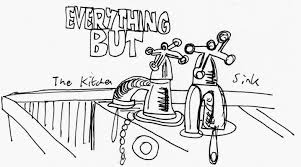
3) Try a variety of tactics
There is no one size fits all for improving your outlook. You have to find what works best for you.
Personally, I've tried a variety of things I learned from reading, plus friends and family. Not all of them have worked for me, but there's some good research and support for all of these.
Try the ones that sound like the best fit for you and your circumstances.
1) Make a daily gratefulness list
Dr. Robert A. Emmons of the University of California, Davis, and Dr. Michael E. McCullough of the University of Miami have studied gratitude extensively, and their findings are pretty amazing.
In one study, they split people into 3 groups: one group wrote about positive things they were grateful for, another wrote about irritations and things that bothered them, and the third wrote about general events.
From there they found:
"Those who wrote about gratitude were more optimistic and felt better about their lives. Surprisingly, they also exercised more and had fewer visits to physicians than those who focused on sources of aggravation."
Who doesn't want to be healthier and feel better about life? Try writing about 3 things you're grateful for each morning and before bed, and see how it may improve your outlook.

2) Change the music you listen to
This tactic comes from a Lighthouse email subscriber, who replied to our newsletter-exclusive email about mindsets last week (you can sign up here). She told us how she found changing her music to be more positive has helped her outlook.
As it turns out, there's research to back this up. Psychologists Yuna Ferguson of Knox College, and Kennon Sheldon of the University of Missouri found across 2 studies:
"Listening to positive music may be an effective way to improve happiness, particularly when it is combined with an intention to become happier."
Try adjusting the music you listen to when you're stressed or upset to help you relax and shift your mindset. Death metal, or some angry T Swift tracks may help you seethe in the moment, but it won't keep you from biting a team member's head off if they interrupt you.
3) Take a walk in nature
A variety of research has shown that spending time in nature can relieve stress, improve your mood, and make you more likely to exercise (which has its own benefits).
In one such study by the University of Derby in the UK, where participants spent time in nature each day for 30 days found all of these benefits:
- "The number of people reporting their health as "excellent" increased by 30%"
- "Children showed increases in self-esteem."
- Other benefits included, "more life satisfaction, positive affect and vitality at levels associated with established predictors of satisfaction, such as personal income."
All this from getting outside for a few minutes a day.
Whether you are lucky enough to have hiking trails near your work or home, or a grassy lawn to relax on, find a piece of nature to spend some time on. You may be surprised how it can boost your mood.
4) Turn off or tune your social media
This one is really personal for me. I used to get a lot of anxiety using Twitter after Trump won the Presidency. The amount of vitriol and division was extremely stressful as I saw so much hate from people I knew and respected. I could feel the anxiety build up, and stick with me long after I closed the app.
I finally fixed it by changing my habits. First, I reduced how often I used Twitter and Facebook. Then, the real breakthrough came when I started unfollowing, muting, and blocking things I didn't want to see. As it turns out, even your friends often won't notice if you don't see their angry posts.
I'd much rather remember my friends and colleagues for their talents and sense of humor than their rants and arguments on the internet. And all that toxicity online? You won't miss it.
5) Use Morning Pages
A friend of mine turned me onto Morning Pages a few years ago, and it's been a hugely powerful tool for me ever since. It's a simple habit that makes a big difference:
"They are about anything and everything that crosses your mind– and they are for your eyes only. Morning Pages provoke, clarify, comfort, cajole, prioritize and synchronize the day at hand.
Do not over-think Morning Pages: just put three pages of anything on the page...and then do three more pages tomorrow."
To do Morning Pages, simply get a notebook and write whatever is on your mind. Let it run until you've exhausted whatever you're thinking or feeling.
When emotions get the best of me, or I feel something boiling inside, I know it's time to write again. Getting thoughts out of me and onto paper has a cathartic effect; the act expels negative energy leaving it on the page and away from me. I always walk away feeling better.
If you have ideas or feelings swirling in mind that seem to be stewing, try some Morning Pages to set them (and you) free.

Build a culture of Positive Outlooks
As a leader, you set the example for your team. Nothing matters more than your actions in building a healthy culture.
As you set out to have your own more positive outlook, you may find your team starts to pick up on it. Maybe they're more cooperative and responsive to you. Or you may see them being more positive, too.
Setting a good example by having a positive outlook builds a foundation for the rest of your team to be positive, too.
From there, you can start to reinforce it and build a culture of positive outlooks by trying the following:
- Talk to your team about it in group settings and your 1 on 1s.
- Share the tactics that worked for you, and encourage them to try them as well.
- Praise your team intentionally and specifically when they show a positive outlook.
- Ask your team for ideas to be more positive, and try tactics like this awesome Code Review approach
- Create some type of Hat tips/high fives process on your team to highlight positives (weekly email, beginning of a key meeting, etc) like Mark Crowley did.
When you bring a positive outlook to work, you may be surprised how it changes your life. As the stories in the beginning of this post show, a lot of life is in how you look at it. However, it's important not to overdo with positivity, as that can lead to toxic positivity where problems are ignored or minimized
Now, the challenge turns to you: Are you ready to work on your mindset?
Want to continue learning about 1 on 1s? This post is one of dozens we have to help you be your best in any situation. Find our comprehensive guide to one on one meetings here.

